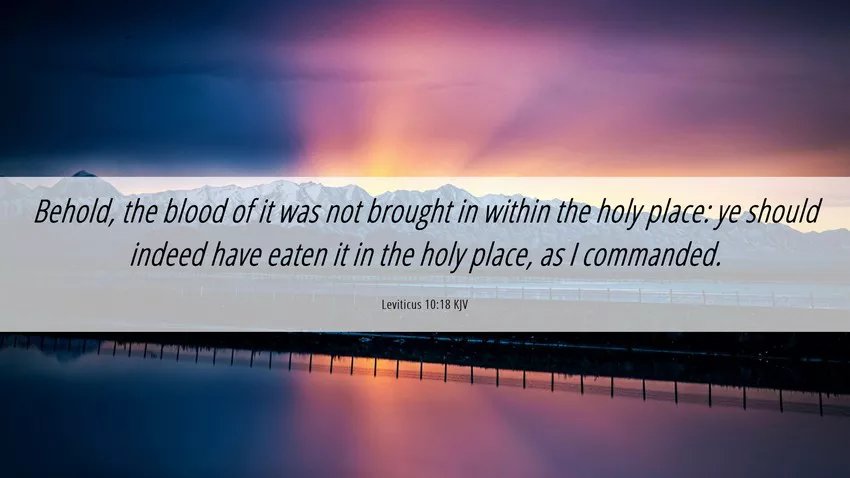Read the Daily Bible Verse – Leviticus 10:18 To Strengthen Your Spiritual Journey.
Leviticus 10:18 is a verse that may seem complex at first glance, but it holds significant meaning when understood in its proper context. This verse is part of a larger narrative in Leviticus that emphasizes the importance of obedience, holiness, and the proper handling of sacred duties. In this article, we will explore the context, meaning, and application of Leviticus 10:18, drawing connections between the duties of the priests and the responsibilities of believers today.
The Context of Leviticus 10:18 KJV
Leviticus 10:18 is set in the aftermath of a tragic event involving Aaron‘s sons, Nadab and Abihu. These two priests offered “strange fire” before the Lord, which He had not commanded, and as a result, they were consumed by fire from the Lord (Leviticus 10:1-2). This event serves as a sobering reminder of the seriousness with which God views obedience and holiness.
Following this incident, God gives specific instructions to Aaron and his remaining sons, Eleazar and Ithamar, regarding their priestly duties. These instructions include how to handle the offerings and the portions that are to be eaten by the priests and their families. Leviticus 10:18 is part of these instructions, focusing on the handling of the sin offering.
Leviticus 10:18 (KJV)
“Behold, the blood of it was not brought in within the holy place: ye should indeed have eaten it in the holy place, as I commanded.”
This verse describes Moses‘ reaction when he discovers that the blood of the sin offering had not been brought into the holy place as commanded, and that the priests should have eaten the offering in the holy place.
Leviticus 10:18 Meaning
The sin offering was a crucial part of the sacrificial system, designed to atone for the sins of the people. According to the instructions given by God, the blood of the sin offering was to be brought into the holy place and sprinkled before the Lord (Leviticus 6:30). This act symbolized the atonement for sin and the purification of the people.
When Moses finds out that the blood of the sin offering had not been brought into the holy place, he reprimands Eleazar and Ithamar. His reprimand stems from the fact that they had not followed God’s specific instructions regarding the sin offering. This deviation from God’s command was a serious matter, as it undermined the integrity of the sacrificial system and the role of the priests as mediators between God and the people.
The instruction to eat the sin offering in the holy place was also a command that had not been followed. Eating the sin offering in the holy place symbolized the priests bearing the iniquity of the congregation and making atonement for them. By not following this command, Eleazar and Ithamar failed in their duty to represent the people before God.
Leviticus 10:18 Application in Life
While Leviticus 10:18 is specifically about the duties of the priests, its principles can be applied to the lives of Christians today. Here are some ways in which this verse can inform our faith and practice:
1. The Importance of Obedience
The primary lesson from Leviticus 10:18 is the importance of obedience to God’s commands. Eleazar and Ithamar’s failure to follow God’s instructions regarding the sin offering serves as a warning to all believers about the seriousness of disobedience. As Christians, we are called to obey God’s Word and follow His commands, even when they may seem difficult or inconvenient.
2. Handling Sacred Responsibilities with Care
The priests had specific responsibilities regarding the offerings, and they were to handle these sacred duties with care and reverence. Similarly, Christians have responsibilities in their service to God, whether in ministry, worship, or daily life. We are called to approach these responsibilities with a sense of reverence and dedication, ensuring that we honor God in all that we do.
3. The Consequences of Deviation from God’s Commands
The incident with the sin offering highlights the consequences of deviating from God’s commands. While Eleazar and Ithamar may have had good intentions, their actions were not in line with God’s instructions, and they faced Moses’ reprimand. This serves as a reminder that even well-meaning actions can have negative consequences if they are not in accordance with God’s will.
4. The Role of Leaders in Correcting Error
Moses’ response to Eleazar and Ithamar demonstrates the role of leaders in correcting error and ensuring that God’s commands are followed. In the church, leaders have a responsibility to guide and correct believers, helping them to stay on the right path and adhere to God’s Word.
5. The Need for Repentance and Restoration
While the text does not explicitly state that Eleazar and Ithamar repented, the incident serves as a reminder of the need for repentance and restoration when we fall short of God’s commands. As Christians, we are called to seek forgiveness and restoration when we sin, and to strive to live in obedience to God.
Conclusion
Leviticus 10:18, though rooted in the specific context of the Israelite priesthood, offers valuable lessons for Christians today. It reminds us of the importance of obedience, the need to handle sacred responsibilities with care, and the consequences of deviating from God’s commands. It also highlights the role of leaders in correcting error and the need for repentance and restoration when we fall short.
As we reflect on this verse, let us be encouraged to live lives that are obedient to God’s Word, handling our responsibilities with reverence and dedication. Let us also remember the importance of seeking forgiveness and restoration when we sin, and the role of leaders in guiding us in our faith journey.
Related topics:


